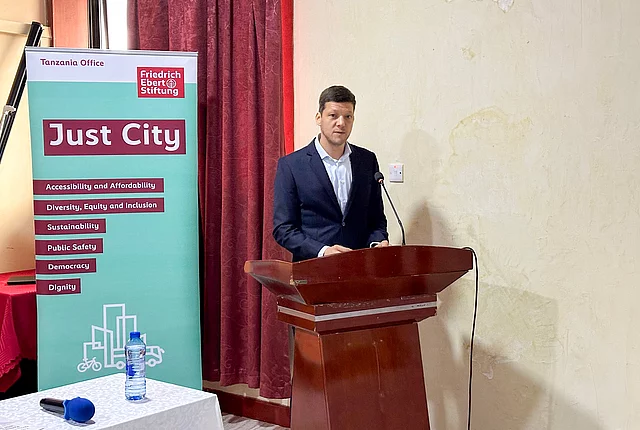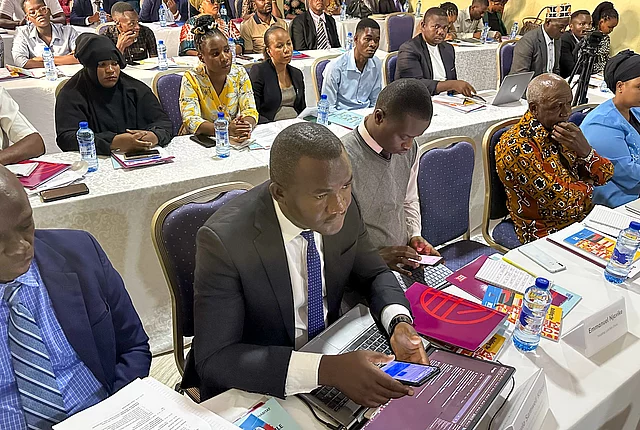- Event
- Just City
Nyumba ni Sisi: Removing the Roadblocks to Adequate and Affordable Housing in Tanzania
On March 25 and 26, 2025, the city of Dodoma became the national stage for a critical conversation about the future of housing in Tanzania. The national conference, aptly named "Nyumba ni Sisi"—Swahili for “We are the House”—brought together voices from across government, civil society, academia, and the private sector to dissect and chart a path forward in overcoming the entrenched barriers to affordable and equitable housing.
The Call to Action: Deputy Mayor Fadhili's Vision
In his introductory comments, Deputy Mayor Fadhili Chibago of the Dodoma City Council established a compelling atmosphere for the discussions. He expressed heartfelt appreciation for the gathering and highlighted the critical and intricate nature of Tanzania's housing dilemma, especially for low-income individuals in urban areas. Reflecting on the historical development of housing in the nation—from colonial influences to contemporary urban challenges—Fadhili illustrated a stark reality of systemic exclusion and lack of investment.
Yet his address was equally forward-looking. Fadhili emphasized the multifaceted benefits of adequate housing, ranging from economic opportunity to urban resilience and social cohesion. “To solve this,” he stressed, “we need strong, inclusive policies rooted in participatory frameworks that consider every Tanzanian's right to a dignified home.”
Beyond Smart Cities: A Shift Toward Justice
Under the theme of "From Smart City to Just City," the first major discussion challenged dominant development paradigms. Participants dissected narratives that position urbanization solely as a growth engine and instead lifted the veil on how such framings often marginalize informal settlements. The idea of a “just city” anchored in equity, inclusivity, and democracy emerged as a guiding vision.
Reassessing the Political Economy of Housing
A second key topic focused on the political economy of housing. Drawing from data, including the 2022 national census (which revealed over 70% of urban buildings are in unplanned areas), speakers laid bare the disconnect between urban expansion and formal housing policy. Structural challenges, including low land tenure rates, inadequate financing, and heavy reliance on the private sector, were named as major obstacles.
Participants advocated for continuous government engagement, housing research, and targeted policy reform as central strategies to move from analysis to action.
Reigniting the Debate on National Housing Policy
The question, “Do we need a stand-alone housing policy?” sparked lively discussions. While some believed that the broader Human Settlements Policy was adequate, many argued that housing requires specific and focused governance attention, similar to areas like energy, land, and water. The consensus was clear: without a dedicated housing policy, efforts to provide affordable housing will continue to be fragmented and reactive.
Housing as a Right: Beyond Shelter
One of the conference’s most moving segments revolved around recognizing housing as a human right. Legal protections, cultural adequacy, habitability, and security of tenure were all framed as non-negotiables. Calls were made for constitutional recognition of housing rights, more transparent urban planning processes, and greater public access to information.
Financing Homes, Not Just Houses
The discussions on housing finance and Public-Private Partnerships (PPPs) highlighted the pressing financial constraints faced by women, informal sector workers, and low-income earners. Participants raised concerns over the National Housing Corporation’s commercial focus, advocating for the revival of a non-commercial national housing bank to better serve vulnerable groups. In addition to that, there was also a strong call for clearer policy direction to microfinance institutions and the development of more inclusive and accessible financial instruments tailored to diverse housing needs
Grounding the Just City Vision: Social Housing and Action Points
In wrapping up, the final discussions centered on just social housing, community-led, equitable, and publicly supported alternatives to profit-driven models. To embed this vision, participants emphasized the importance of advocating for the adoption of a stand-alone housing policy, promoting media collaboration to amplify just city values, and establishing annual housing conferences to sustain momentum. They also stressed the need to enhance access to finance by pushing for a dedicated non-commercial housing institution, while mobilizing political will through the engagement of progressive voices across political parties and government structures.
Toward a Collective Future
More than just another policy forum, Nyumba ni Sisi succeeded in catalyzing momentum for a rights-based, inclusive, and sustainable housing movement in Tanzania. By creating a space where housing is framed not as a commodity but as a civic and social foundation, this conference became a pivotal moment—one that reframes not only urban priorities but the collective imagination of what Tanzania’s cities could and should be.

